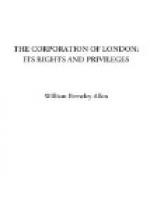The Metage Dues.
The same charter of James I. which confirmed the ancient right of the mayor and commonalty of London to the conservation of the water of the Thames, declares that the citizens are equally, and on the same grounds, entitled to exercise the office of measuring all coals, cereals, fruits, vegetables, salt, and other merchandise sold by measure, brought to the port of London. In the beginning, this privilege arose out of the necessity of ascertaining the exact quantity of these articles actually imported into the City, in order fairly to collect the king’s customs. It has since been found mutually beneficial to all parties that all measurable goods should be meted out by sworn meters, carefully selected for their responsible duties, and over whom is maintained a constant and jealous supervision. The Court of Common Council appoint ten “corn-meters in trust,” who are placed over 150 deputy meters, chosen by the Corn and Coal and Finance Committee, and sworn in the Lord Mayor’s Court to do their duty without fear or favour. There are also a few other officers connected with this very important branch of the civic regulations as to trade, to whom, however, it is unnecessary further to allude than as an illustration of the useful and practical precautions adopted by the Corporation to secure strict fairness of dealing between buyer and seller. The fruit-meters are four in number, who appoint their own deputies, and are equally bound to impartiality. There are likewise twenty-one deputy oyster-meters, one salt-meter and several deputies, and a fruit-shifter and a salt-shifter. It is now proposed to deprive the Corporation of the funds realized by these metage dues. The principle of free trade is to be carried out to an extent that will exclude honesty as an essential ingredient in commercial transactions. Everything, we are told, finds its own level. Every man is the best guardian of his own interests. Neither seller nor buyer will submit to be wronged by the other. It is contrary to the modern system of trade to interfere between dealers and purchasers; they are quite competent to take care of themselves, and are quite ready to dispense with the intervention of a third party. Besides, there is no necessity to do away with sworn meters, payable by the job according to a fixed scale. The only alteration that is required is the confiscation of the right of the Corporation to derive any profit from their labours. This doctrine of confiscation is a convenient one, but it is somewhat inconsistent with the outcry that has so recently been raised because Lord Canning was supposed to have confiscated the rights of certain farmers of the revenue in India; for that is the exact position of a talookdar. Now the Corporation farms, and has from time out of mind farmed, the revenue arising from these various sources. The sovereign is the seignior of the City, and therefore entitled in the first instance to all customs, duties, revenues, and imposts levied




